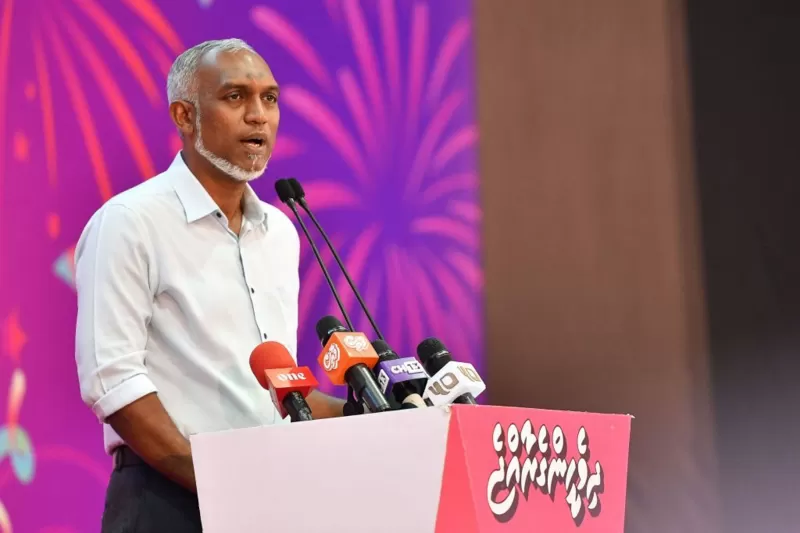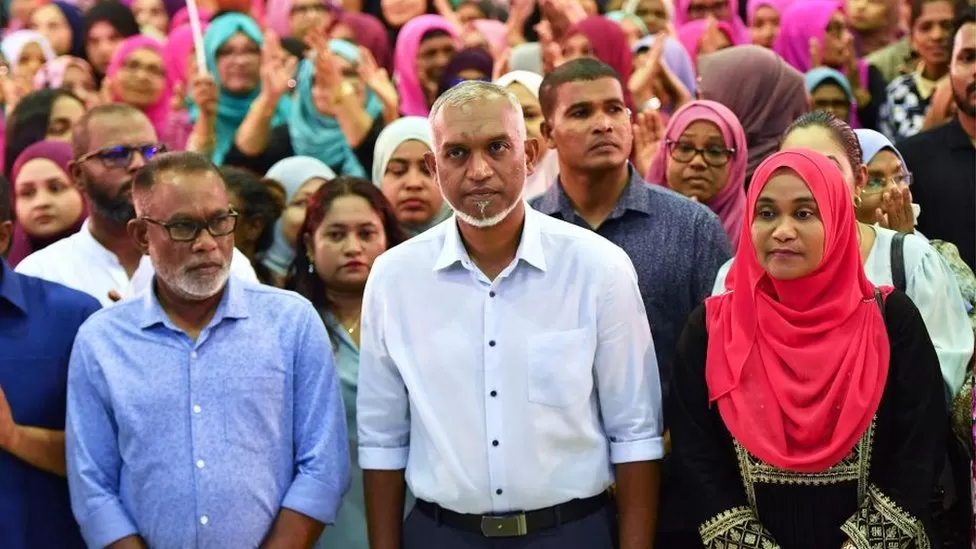The new President of Maldives has stated, "Every Indian soldier should leave from here."

"We don't want any foreign soldiers on Maldivian soil... I made a promise to the people of Maldives, and I will fulfill my promise from the very first day," said the newly elected President of the Maldives, Mohammed Muizzu.
Muizzu, who won the presidential election last month, will assume office in November. He mentioned in an exclusive interview with the BBC that he had met with the Indian High Commissioner a few days ago.
Muizzu stated, "I have been very clear to them that every Indian soldier stationed in the Maldives should be removed from here."
The Maldives has been under the influence of India for an extended period, and Muizzu's demand could strain the relationship between India and the Maldives. When Muizzu won the election, it was seen as a setback for India, especially since his rival and the incumbent President, Ibrahim Solih, had strengthened ties with India after assuming power in 2018.
The coalition supporting Muizzu expressed concerns about India's growing influence in the Maldives due to Ibrahim Solih's "India First" policy, deeming it a threat to Maldives' security and sovereignty.
On the other hand, Muizzu's coalition is supportive of closer relations with China. China has invested billions of dollars in the Maldives for foundational infrastructure and development projects.
The Maldives is strategically significant for monitoring a large part of the Indian Ocean, making it important for both India and China. India has also invested close to two billion dollars in development projects in the Maldives.
If Indian soldiers are compelled to leave the Maldives, it could be a significant setback for India. India had previously gifted two helicopters in 2010 and 2013, as well as a small aircraft in 2020. These gestures had sparked disputes, and the opposition alliance in the Maldives had capitalized on the "India Out" slogan during the elections.
India had previously stated that these aircraft were meant for search and rescue missions as well as medical emergencies. However, in 2021, the Maldivian security forces revealed that nearly 75 Indian soldiers were present in the Maldives, responsible for operating these helicopters and aircraft.
This raised suspicions and anger, with many concerned that these aircraft were being used as a pretext to station Indian soldiers in the Maldives.
Muizzu claims that the presence of these Indian soldiers could pose a security risk to the Maldives, especially if tensions escalate on the India-China border. He stated, "The Maldives is too small to get entangled in this global power struggle. We won't get involved in it."
During the elections, outgoing President Ibrahim Solih had also raised concerns about the presence of Indian soldiers, emphasizing that there were no foreign soldiers stationed in the Maldives at the time and that Indian soldiers present were working under the command of the Maldives National Defence Force.
However, for Muizzu, this controversy extends beyond just the aircraft. He intends to review all recent agreements with India. He mentioned, "We don't know what's in these agreements. Even in parliament, some members had said they were unaware of the details. I will find out."
This development could lead to a reevaluation of the relationship between the Maldives and India and potentially impact the regional dynamics.
Analysts noted that, following Muizzu's victory, the first diplomats to congratulate him in the Maldives were Chinese. Chinese President Xi Jinping had also expressed his willingness to work with President Muizzu to further develop bilateral relations and deepen practical cooperation to advance their traditional friendship.
Muizzu openly praised China's development programs in the Maldives, stating that Chinese investments had transformed the city of Malé and benefited the local population.
However, Muizzu has distanced himself from the label of being a "China supporter." He emphasized his commitment to the Maldives above all, saying, "I am a Maldives supporter. For me, the Maldives comes first. We value our sovereignty first. I am neither with any country nor against any country."
Despite his claims, his coalition includes the party of former President Abdulla Yameen, who played a significant role in bringing the Maldives closer to China during his tenure.
This mix of policies and alliances could influence the Maldives' foreign relations in the coming years, with potential repercussions for both India and China.
When India and Western nations were reluctant to lend to the Yameen government due to allegations of human rights abuses, they turned to China. China offered assistance without conditions. Yameen was serving an 11-year prison sentence for corruption at that time.
Later, he became involved with President Xi Jinping's Belt and Road Initiative (BRI), a project aimed at connecting China with the rest of the world through roads, railways, and maritime routes.
Muizzu was seen as Yameen's proxy. He was contesting the election to prevent Yameen from doing so.
Shortly after winning the election, Muizzu called on the current government to release Yameen from high-security prison to house arrest.
However, given Yameen's troubled relationship with India and Western nations, it could be a challenge for Muizzu to maintain balanced relations with India.
Muizzu is eager to step out of Yameen's shadow and take a new path in domestic and foreign policy. His decisive victory may suggest that he won't face significant domestic opposition, at least initially.
He seems committed to distancing the Maldives from India's sphere of influence, but denying India's request to bring back its soldiers will likely be his first significant challenge.
- Web Development
- Art
- Causes
- Crafts
- Dance
- Drinks
- Film
- Fitness
- Food
- Games
- Gardening
- Health
- Home
- Literature
- Music
- Networking
- Other
- Party
- Religion
- Shopping
- Sports
- Theater
- Wellness




